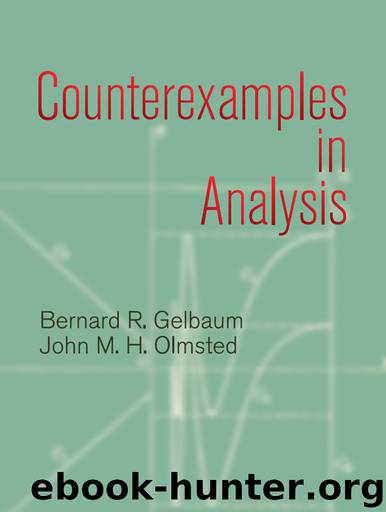Counterexamples in Analysis by Bernard R. Gelbaum

Author:Bernard R. Gelbaum
Language: eng
Format: epub
Publisher: Dover Publications
Published: 2012-06-26T16:00:00+00:00
for every and , then μ(A) = 0 for every . We shall now prove this fact.
We start with an equivalence relation ∼ defined on (0, 1] × (0, 1] as follows: x ∼ y iff . By means of ∼ the half-open interval (0, 1] is partitioned into disjoint equivalence classes C. The axiom of choice, applied to this family of equivalence classes, produces a set A having the two properties: (1) no two distinct points of A belong to the same equivalence class C; (2) every equivalence class C contains a point of A. In terms of the equivalence relation ∼ these two properties take the form: (1) no two distinct members of A are equivalent to each other; (2) every point x of (0, 1] is equivalent to some member of A. We now define, for each , an operation on the set A, called translation modulo 1, as follows:
Download
This site does not store any files on its server. We only index and link to content provided by other sites. Please contact the content providers to delete copyright contents if any and email us, we'll remove relevant links or contents immediately.
| Algebra | Calculus |
| Combinatorics | Discrete Mathematics |
| Finite Mathematics | Fractals |
| Functional Analysis | Group Theory |
| Logic | Number Theory |
| Set Theory |
Modelling of Convective Heat and Mass Transfer in Rotating Flows by Igor V. Shevchuk(6424)
Weapons of Math Destruction by Cathy O'Neil(6252)
Factfulness: Ten Reasons We're Wrong About the World – and Why Things Are Better Than You Think by Hans Rosling(4726)
A Mind For Numbers: How to Excel at Math and Science (Even If You Flunked Algebra) by Barbara Oakley(3289)
Descartes' Error by Antonio Damasio(3263)
Factfulness_Ten Reasons We're Wrong About the World_and Why Things Are Better Than You Think by Hans Rosling(3224)
TCP IP by Todd Lammle(3170)
Fooled by Randomness: The Hidden Role of Chance in Life and in the Markets by Nassim Nicholas Taleb(3098)
The Tyranny of Metrics by Jerry Z. Muller(3054)
Applied Predictive Modeling by Max Kuhn & Kjell Johnson(3053)
The Book of Numbers by Peter Bentley(2957)
The Great Unknown by Marcus du Sautoy(2682)
Once Upon an Algorithm by Martin Erwig(2639)
Easy Algebra Step-by-Step by Sandra Luna McCune(2621)
Lady Luck by Kristen Ashley(2571)
Police Exams Prep 2018-2019 by Kaplan Test Prep(2532)
Practical Guide To Principal Component Methods in R (Multivariate Analysis Book 2) by Alboukadel Kassambara(2531)
All Things Reconsidered by Bill Thompson III(2383)
Linear Time-Invariant Systems, Behaviors and Modules by Ulrich Oberst & Martin Scheicher & Ingrid Scheicher(2357)
